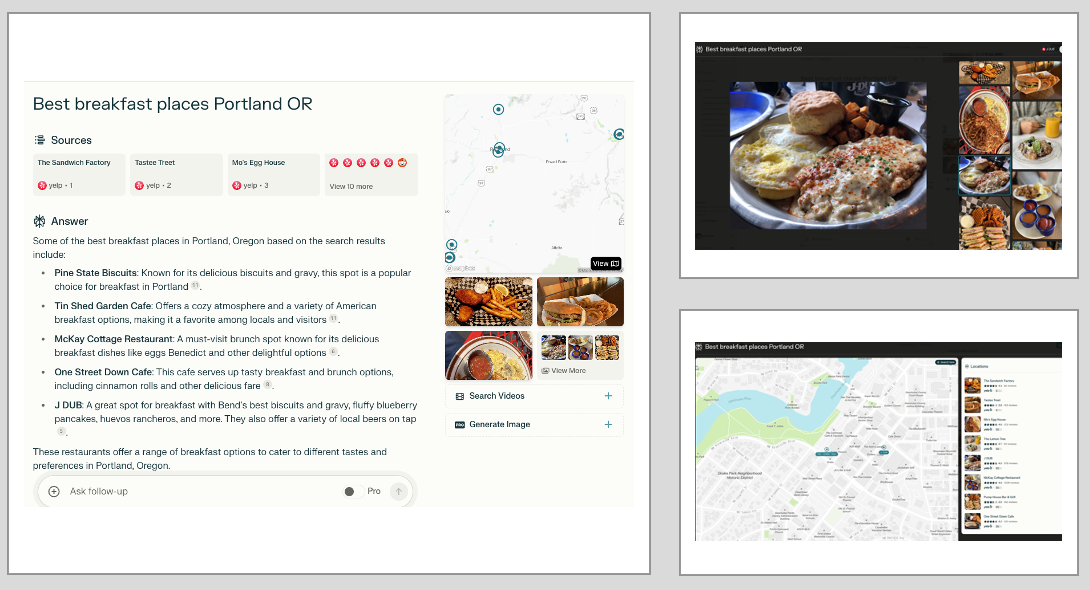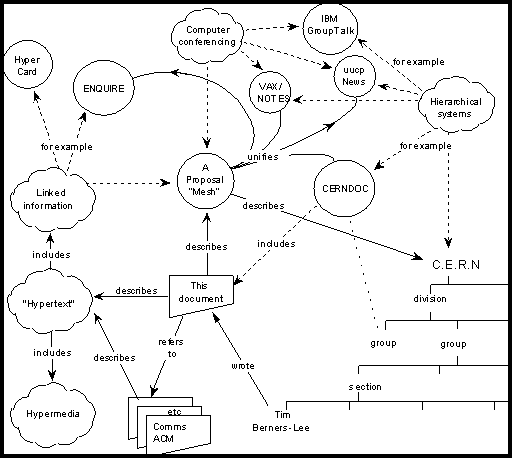Perplexity Yelps, FTC Pins Location Brokers, Web at 35

Perplexity Taps Yelp for Local Search
Perplexity has integrated Yelp data (Fusion API) into its results for improved local answers. The API offers full access to Yelp's data and search capabilities, including name, address, phone number, images, reviews, pricing information and hours of operation. Perplexity didn't disclose any financial terms. This is part of a much larger trend in the "AI industry" to directly license content from sources, which includes Google's recent $60 million deal with Reddit and, this week, ChatGPT's deal with European news publishers. You can now do any search on Perplexity that you might have done on Yelp, although the presentation of results needs to be refined and and there are occasional bugs. For some queries (e.g., home services), Perplexity also shows content from other local directories such as Home Advisor or Thumbtack. Below is an example search result for "best breakfast places Portland OR." You get a "SERP" with listings, a clickable map and images. The photo pages are linked to their source listing on Yelp. There are several "cards" at the top of the results that also take users to individual listings on Yelp. Most of the major AI platforms, especially BingGPT and Gemini, deliver local results. Perplexity CEO Aravind Srinivas told The Verge that people are using AI like search and so this was an effort to meet those expectations.

Our take:
- So far none of the AI sites does a better job with local than Google, not even Gemini, which is supposed to have access to the identical information.
- This is "early days" for local content in AI and we assume the UI, data richness and accuracy will only improve.
- You can ask AI to "create an itinerary for a 7 day London trip including a 4+ star hotel that's under $200 per night" and get reasonably good results. That efficiency gives it an advantage vs. search.
Is 'Location Intelligence' Dead?
Earlier this month the FTC put out a press release about how it was cracking down on unauthorized online data collection, in three recent settlements involving Avast, X-Mode and InMarket. Anti-virus software maker Avast was capturing user browsing data in a way that might allow people to be individually identified. X-Mode and InMarket were spanked because of their location data collection practices. The thrust of the FTC's complaint against InMarket, in particular, was that the company failed to properly inform consumers their location data was being captured and how it was being used or to obtain consent in the process. This was true with InMarket's own consumer apps and its SDK partners. The settlement and order require InMarket to create new privacy programs, monitor partners and prohibits the company from "selling or licensing precise location data—a first for the FTC." It mandates that they obtain informed consent before collecting and using location data. The FTC also made this striking statement in its press release: "Browsing and location data are sensitive. Full stop."

Our take:
- The FTC is saying, any precise (mobile) location data collection is "sensitive." The only way to legally collect it is via consent.
- Location data is extremely valuable to marketers/brands but the industry has effectively screwed itself by failing to be transparent with users.
- The FTC is making location data collection totally opt-in. We know that when consumers are asked to consent to data collection, the vast majority do not.
State of the Web at 35
It was 35 years ago that Tim Berners-Lee generated a proposal for "information management" at CERN, which evolved into the web. In a blog post this week, he reflects on the past roughly three decades of the internet: "It was to be a tool to empower humanity ... [yet] instead of embodying these values, the web has instead played a part in eroding them." Instead of becoming a force for public good, Berners-Lee laments, it has become a tool of exploitation, disinformation, unethical data collection and magnified the forces of capitalism "resulting in monopolisation." He then goes on to propose some solutions, one of which is giving control of data to individuals – the creation of "personal online data stores," an old-ish idea that coincidentally is at the center of his new startup Inrupt. In an interview with CNBC, Berners-Lee makes three predictions about the internet's future: 1) everyone will have a personal AI assistant, shifting online interactions toward "AI intermediaries"; 2) users will come to truly own and control their data; 3) a major tech company will be broken up.

Our take:
- The idea of the internet being a force for public good is desirable but now seems almost quaint and certainly naive in retrospect.
- The EU's tech regulations, now including AI, seek to correct the abuses Berners-Lee describes. Success is far from certain, however.
- Berners-Lee's prediction of an AI mediated internet is highly likely. His desire to give individuals more data control will probably happen though not as he envisions.
Recent Analysis
- Near Media podcast 149: Google’s Core Update & FUD, BrightLocal Consumer Review Survey, Do Searchers Use the Local Finder?
- IYCMI: Why Local Searchers Look to the Local Finder, by Mike Blumenthal.
Short Takes
- Google separates "bookable services" from others in GBP.
- Google matching images and "related reviews" in GBPs.
- Google Map in the Business Profile no longer clickable in the EU.
- Google boosting prominence of local links in SERPs in Europe.
- Traffic losses from SGE (if launched) expected to be 20% to 60%.
- OpenAI continues to drop new Sora videos, will be public in late 2024.
- Ad pop-ups are consumers' biggest online CX complaints.
- US House of Reps passes "TikTok ban" bill but path forward murky.
- TikTok using sophisticated targeting to rally users against potential ban.
- Apple to allow EU developers to distribute apps from their own sites.
- Amazon AI can create a product listing page with a website URL.
- US online retail sales up more than 18% YoY in February.
Listen to our latest podcast.

How can we make this better? Email us with suggestions and recommendations.

